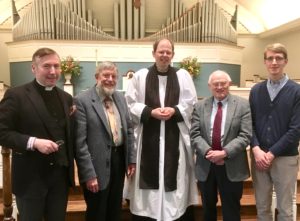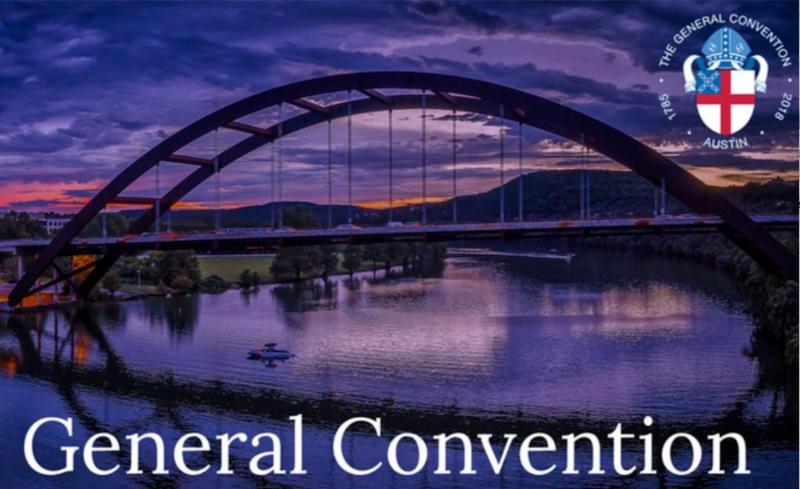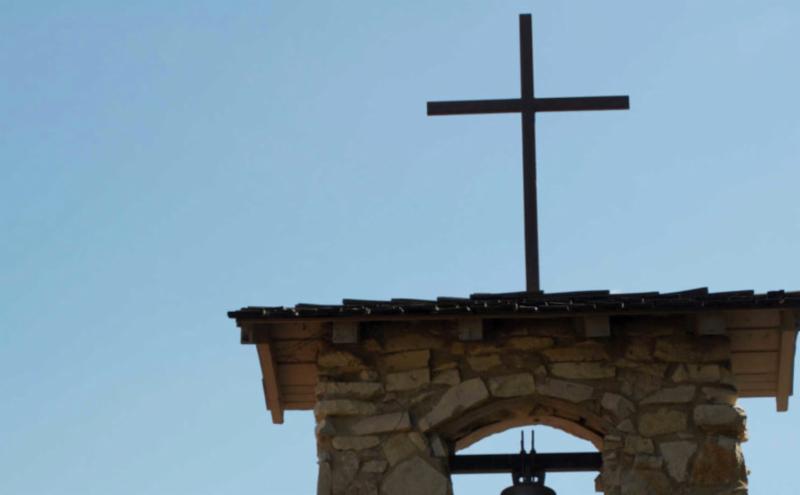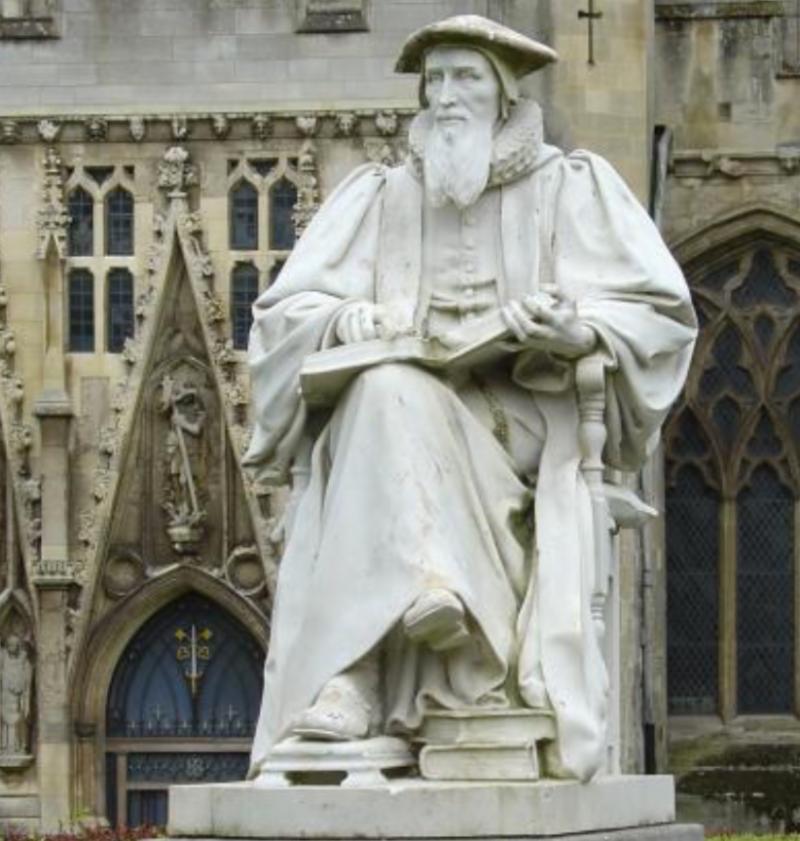Remember to book your place !
Bishop C. FitzSimons Allison
The Elusiveness of Freedom
The Anglican WayLecture 2019
Bishop Allison, 12th Bishop of the Diocese of South Carolina (retired) was born in Columbia, S.C. and later attended the University of the South before and after serving with distinction in the United States Army in World War II
He next undertook studies at the Virginia Theological Seminary, from which he graduated with a Bachelor of Divinity degree before being ordained deacon in June 1952 and priest in May 1953.
He then began advanced studies and research in Oxford where he received his D.Phil. degree in 1956 and he then taught church history at the School of Theology of the University of the South and at Virginia Theological Seminary.
He was appointed rector of Grace Episcopal Church in New York City before being elected coadjutor bishop in the Episcopal Diocese of South Carolina where he became the twelfth bishop in 1980.
Bishop Allison retired in 1990 but has since continued his extensive preaching, speaking, and writing ministry.
David K. Anderson
‘We know not what to say’:
Epistemic Humility in John Donne’s ‘A Litany’.
David Anderson is an associate professor in the University of Oklahoma, English Department and Senior Fellow of Dunham College, one of OU’s residential colleges.
Professor Anderson studies the poetry and drama of the English Renaissance, and the relationship between literature and religion. He is particularly interested in William Shakespeare, John Milton, Christopher Marlowe, John Donne, John Foxe, and George Herbert, as well as Reformation history, the Western theological tradition, and the work of René Girard.
His first book is entitled Martyrs and Players in Early Modern England: Tragedy, Religion, and Violence on Stage and was published by Ashgate Press in 2014. It considers how the sixteenth-century cultural crisis surrounding religious violence is reflected in the tragedy of Shakespeare and his contemporaries. He has published articles on John Donne (Renaissance and Reformation), King Lear (ELH), Marlowe (Texas Studies in Literature and Language)and on political theology and As You Like It (Reformation).
Prof. Anderson’s next project is entitled Shakespeare at the Still Point. It will argue for the centrality of Christian neighbour-love (agape) to Shakespeare’s drama. Beyond that, he is interested in the shifting, overlapping, and contradictory conceptualizations of freedom in the early modern period and also in Milton’s political theology and his place in the Protestant theological tradition.
A native of Ontario, Canada, Prof. Anderson has a B.A. (Hon) from Queen’s University (Kingston), an M.A. from Dalhousie University (Halifax), and a Ph.D. from McGill University (Montreal). He has previously taught courses at McGill, Trinity College (at the University of Toronto), and Ryerson University.
Roberta Bayer
Hooker, Wilson, Natural Law & the American Constitution,
Intellectual historians have remarked that Richard Hooker’s Ecclesiastical Polityplayed a role in the framing of the jurisprudence behind the American constitution . Indeed this is true; Hooker’s argument that civil law derives its power from the principle of consent was revived at the time of the Framing, along with a strong argument for natural law as the foundation of human law, in the work of James Wilson. (All of which attests to the significant presence of classical Anglicanism at the American Framing).
James Wilson was a signer of the Declaration, important interlocutor during the constitutional debates and a justice of the first Supreme Court. Richard Hooker’s Ecclesiastical Polityis central to Wilson’s Lectures on Law,which were delivered in Philadelphia in 1790 – 1793. In these lectures he unites the principle of consent and description of Law — eternal, divine, natural and human, from Book I of the Polity, in order to make an argument for public reason as the only just foundation for American democracy.
Dr. Bayer is Associate Professor of Political Philosophy at Patrick Henry College, where she has just returned after a one year terms as Garwood Visiting Fellow in the James Madison Program at Princeton University. Before coming to Patrick Henry College, she taught at the University of King’s College, Halifax, Nova Scotia, Saint Mary’s College, Leavenworth, Kansas, and George Mason University, Fairfax, Virginia. Roberta teaches courses on the American Founding, Medieval Philosophy, and contemporary Christian thought. She followed the late Dr Peter Toon as a long serving editor of the Anglican Waymagazine on behalf of the Prayer Book Society of the United States, and has edited a volume of essays entitled Reformed and Catholic: Essays in Honor of Dr. Peter Toon.
Jesse Billett:
“Laying Bare the Groundwork”:
The Anglican Formularies and the Eucharistic Theology
of F. D. Maurice
What must a “Classical Anglican” believe and not believe about the Eucharist?
Anglicanism professes no doctrine but that of scripture, as interpreted by the catholic consensus of the Church: “The doctrine of the Church of England is grounded in the Holy Scriptures, and in such teachings of the ancient Fathers and Councils of the Church as are agreeable to the said Scriptures” (Canon A5). But what is the content of that doctrine? “In particular such doctrine is to be found in the Thirty-nine Articles of Religion, The Book of Common Prayer, and the Ordinal”—that is, in the Anglican “formularies,” to which may be added the Two Books of Homilies (1547, 1571) and the Canons Ecclesiastical (1604), which the formularies themselves cite as authorities.
In the mid-nineteenth century, when some Anglo-Catholics were departing to Rome because they found the formularies too narrowly “Protestant,” and when some Evangelicals were urging that the formularies needed to be revised because they were too susceptible of a “Catholic” interpretation, Frederick Denison Maurice (1805–72) articulated a vision of the Eucharist that engaged with the Anglican formularies, not as exhaustive in themselves, but as “laying bare the groundwork” of a true theology, i.e. the Living Word himself, by “giving direction and method to thoughts and inquiries” and by preventing “various superstitions from making the thoughts and inquiries abortive.”
Maurice’s Eucharistic writings reveal how deeply he had meditated on the words of the formularies, being led by them to see the Eucharist as the “centre of unity” between God and man, a unity brought about by the once-for-all sacrifice of Christ’s body and blood, made literally, objectively, and personally present in the sacrament, not by a “descent” of Christ into bread and wine, but in such a way that we “enter into fellowship with Christ as he is, ascended at the right hand of God, in a body of glory and not of humiliation.”
Maurice’s Eucharistic doctrine exemplifies how the Anglican formularies mark out the boundaries of a theology that is simultaneously “Catholic and Reformed.”
Jesse D. Billett is Associate Professor in the Faculty of Divinity at Trinity College in the University of Toronto, where he teaches Liturgy and Church History. He holds degrees in Music (AB, Harvard) and History (MPhil, PhD, Cambridge). His research publications have centred mainly on the liturgy of the medieval Church and particularly on the Divine Office, the daily “hours of prayer” in religious communities, which at the English Reformation were condensed into the Prayer Book services of Mattins and Evensong. He is a student and practitioner of liturgical music, especially Gregorian chant, and was formed in the Anglican choral tradition as a choral scholar at King’s College, Cambridge. Jesse lives in Toronto with his wife, Jill, and their three young children. They are parishioners of St. Bartholomew’s Church, Regent Park, where the Prayer Book inheritance is lived out in its generous integrity.
Samuel Bray
The Shape Fallacy,
Reconsidering the Book of Common Prayer as Text
Professor Samuel L. Bray joined the Notre Dame Law School faculty in 2018, having previously served as assistant professor of law at UCLA from 2011 to 2016, and a professor of law from 2016 to 2018. He was a Harrington Faculty Fellow at the University of Texas-Austin for the 2016-2017 academic year.
Bray is a graduate of the University of Chicago Law School and clerked for then-Judge Michael W. McConnell on the U.S. Court of Appeals for the Tenth Circuit. After clerking, he practiced law at Mayer Brown LLP, was an associate-in-law at Columbia Law School, and was executive director of the Constitutional Law Center at Stanford Law School.
Torrance Kirby:
Conversion of object or subject?
The hermeneutics of presence in Reformation sacramental debates
Among objects of conversion associated with religious controversies of the 16th century, perhaps the most contentious of all was the Sacrament of the Eucharist. The received medieval account of sacramental presence according to the doctrine of Transubstantiation had been promulgated at the Fourth Lateran Council in 1215. This formal affirmation of ontological conversion of the object, the physical elements of the sacrament (Latin: transubstantio; Greek: μετουσίωσις) became a key focus of Tridentine definition and occasioned sustained controversy throughout the Reformations and Counter Reformations of the sixteenth century and later.
In England Stephen Gardiner responded to escalating attacks on sacramental “real presence” by an evangelical avant-garde as well as by a phalanx of continental divines, among them Huldrych Zwingli of Zurich and the Florentine Peter Martyr Vermigli. In his Tractatio of 1549, the latter asserted a presence apprehended ‘by faith alone’ which demanded a subjective grasp of transcendent presence altogether beyond the object itself. Vermigli’s “instrumental realism” was taken up by his disciple John Jewel in his Challenge Sermonat Paul’s Cross in 1559, which in turn shaped Richard Hooker’s sacramental hermeneutics.
This paper will address this controversy over the conversion of the sacramental object and the implied ontology of “presence” with a view to exploring early-modern hermeneutical reflection on the relation of “signs” to “things signified”.
Torrance Kirby is Professor of Ecclesiastical History in the School of Religious Studies at McGill. He received his D.Phil degree in Modern History from Oxford for a thesis on the political theology of Richard Hooker having taken his BA (First Class Honours) and MA degrees in Classics (Greek Philosophy and Literature) from King’s College and Dalhousie University. He is also a Fellow of the Royal Historical Society and member of the Centre of Theological Inquiry, Princeton, and an honorary Fellow of Corpus Christi College, Cambridge
Bradford Littlejohn:
Hooker and the Meaning of Anglican Conservatism
Anglicanism has often been characterized as having a reflexively “conservative” disposition—an appreciation for the past, for order, structure, and hierarchy, a cautious approach to change, and a suspicion of rigid dogmatisms—and Richard Hooker, more than any other thinker, has often been credited with lending the tradition this distinctive character.
There is much truth in these characterizations, but we must be careful to clarify the precise character of this conservatism, especially in light of later developments within Anglicanism, such as the Oxford Movement.
Two features of Hooker’s “conservatism” in particular demand highlighting. First, for Hooker, conservatism is not a hostility toward change, as if the past had intrinsic superiority to the present, but rather a framework for undertaking responsible change.
Second, Hooker’s concept of “tradition” has been frequently misunderstood as something substantially identical to—albeit less authoritative than– the Roman Catholic concept. In fact, however, while Hooker does value and esteem catholic traditions of the church, his conservatism is also a distinctly national conservatism: a defense of English traditions and laws, and the need to protect these from foreign institutions and ideologies.
By clarifying the character of Richard Hooker’s conservatism, we can gain fresh insight for how it can continue to nourish Anglican and American conservatism today.
Bradford Littlejohn (Ph.D, Edinburgh) is Headmaster of Loudoun Classical School and President of the Davenant Institutean organization dedicated to Protestant ressourcement. He has taught philosophy and political theory at the Moody Bible Institute and Patrick Henry College. He is a leading scholar of the life and thought of Richard Hooker and has been very active in seeking to bring Hooker’s work back to a broader audience in the modern church.
Since 2015, he has published Richard Hooker: A Companion to His Life and Work, edited Richard Hooker and Reformed Orthodoxy, and edited/translated The Laws of Ecclesiastical Polity in Modern English, among many other projects.
William McKeachie
“Goodness had nothing to do with it”
Classical Anglicanism à la Elizabeth I,
Mae West, and William H. Ralston, Jr.
Recent discussion among scripture-rooted and tradition-oriented members of the Prayer Book Society seems to have skirted certain implications of the ‘critical’ bent of much modern Anglican theology and historiography. Those implications prompt what should surely be a prior question or two: Is there, even among fraternally traditionalist Anglicans, any truly ‘common’ understanding of what constitutes ‘Classical Anglicanism’? How might one identify the criteria appropriate to resolving such a question? My hope for this Conference is that — through historical scholarship, examination of texts, and the give-and-take of mutual reflection — we might begin to essay together some such understanding of the judicious criteria, distinctive lineaments, and at least notional boundaries of ‘Classical Anglicanism’ in theology, liturgy, and literature, particularly in the contexts of 16th/17th century early-Modernity and 20th/21st century post-Modernity. I propose, in this 90th anniversary year of the birth and 45th of the ‘call’ to be the Twelfth Rector of St. John’s, Savannah, of the Reverend William H. Ralston, Jr., to ‘remember’ him as representing the very genius of Anglican Christianity. For in the course of the quarter-century during which Fr. Ralston served here, both he and this parish embodied historic Prayer Book Anglicanism not just in terms of its liturgical standards (already even then widely compromised by denominational trends in the Episcopal and Anglican world at large) but in terms of a more excellent, indeed more essential Anglican Way than that of the revisionism and retreat elsewhere. In other words, during the very years of institutional Anglicanism’s self-deconstruction, Fr. Ralston and St. John’s conserved, celebrated, and commended a version of the ethos of the Elizabethan Settlement still alive and well right here on Madison Square. Moreover, in the words of one of Fr. Ralston’s more contemporary sources of inspiration: “Goodness had nothing to do with it!”
William McKeachie retired as Dean of South Carolina and Rector of the Cathedral Church of St. Luke and St. Paul in Charleston in 2009and subsequently served as Vicar for Parish Ministry at St. Andrew’s Parish, Fort Worth. He was closely involved, as President, in the Mere AnglicanismConferences in Charleston.
Born in New York City, he was educated at the University of the South, Sewanee, from which he graduated in l966 and then undertook further theological studies, as well as university teaching, in Canada, until returning to England where he was ordained priest and pursued post-graduate work while serving as chaplain-in-residence at St. John’s College, Oxford. In 1973 he was appointed to the staff of the Anglican Bishop and Cathedral of Toronto where, as Diocesan Theologian and University Chaplain since when has been active in Anglican-Roman Catholic and Christian-Jewish Dialogue and served as Secretary of the Faith and Order Commission of the Canadian Council of Churches. During his time as Dean in Charleston he was also President of the Society for the Advancement of Christianity in South Carolina as well as President of the Christian/Jewish Council.
Neil Robertson:
Anglicanism in the Age of Modernity
Classical Anglicanism is a peculiar development in the context of the sixteenth and seventeenth centuries, the period in which the emergence of a distinctive modernity was occurring in the western Europe generally. On the one hand this development can be seen as an aspect of this larger cultural, intellectual and spiritual transformation – a distinctively English way of becoming modern. On the other side it can be seen as evading or opposing the emergence of the modern world. This is a complex and difficult question to sort out.
One way to begin thinking about what defines Anglicanism in this period and its relation to “the modern age” is by focusing on how Augustine’s thought figures in both of these worlds. I am indebted to Robert Crouse in taking up this approach.
I want to argue that we can see something of the spirituality of the modern age by thinking about the modern age as a development of Augustine. We can also see classical anglicanism as a distinctive and distinguishable form of Augustinian spirituality. This approach it is hoped will allow us to see the points of connection and convergence between Classical Anglicanism and a very broadly conceived account of modernity (indebted in good measure to Charles Taylor’s work) together with a more precise sense of how Classical Anglicanism retains a relation to older forms that puts it in tension with aspects of the modern world.
As we are today becoming more and more aware of the limitations as well as the accomplishments of modernity, the thought that emerges out of this consideration is that Classical Anglicanism need not be seen as a merely a parochial and historically fixed peculiar institution, but actually provides a unique and spiritually compelling way to live in this very liminal moment as we try to confront, without simply abandoning, our modern age.
Neil G. Robertson is Associate Professor of the Humanities and Social Sciences at the University of King’s College in Halifax, Canada and Director of its Foundation Year Program.He was also the founding Director of the Early Modern Studies Programme at King’s. His publications include co-editing Hegel and Canada(2018), Descartes and the Modern (2008) and Philosophy and Freedom: The Legacy of James Doull, (2003). He has writings have focused on the question of the nature of “modernity”; he has written on Augustine, Luther, Hooker, Shakespeare, Descartes, Locke, Montesquieu and Rousseau, as well as more contemporary thinkers such as George Grant, Leo Strauss, and John Milbank. He is currently writing an introductory volume on the thought and intellectual development of Leo Strauss.
To book your place please use the links below:




































